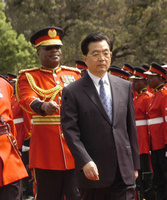When Europe ran the world, trade followed the flag, meaning that globalization in its initial expression -- otherwise known as colonialism -- grew out of the barrel of a gun, to paraphrase Mao Zedong. On this subject, Franklin Roosevelt and Vladimir Lenin agreed, even if that conclusion led them to embrace diametrically opposed strategies: FDR's realization that "the colonial system means war" drove him to erect an international liberal trade order following World War II that doomed the vast colonial systems of his closest European allies. Roosevelt's success not only enabled America to contain and ultimately defeat the soul-crushing Soviet alternative, it laid the initial groundwork for today's American-style "open door" globalization, itself a nod to cousin Theodore. In the end, that "traitor to his class," as Roosevelt was often labeled, should rightfully be acknowledged as the single-most successful anti-imperialist revolutionary leader of the 20th century.
FDR's new world order took decades to emerge, but when it finally did in the post-Cold War '90s, it reversed the sequence established by colonialism. Now the flag follows trade.
Nowhere is this truer than in China's stunning rise, which has seen it become, in the historical blink of an eye, globalization's primary engine of new connectivity. And it has scaled these commanding heights with nowhere near a commensurate level of political-military influence, much less hard assets. China is rapidly shifting from being largely self-sufficient in most strategic resources to being frighteningly dependent for them on virtually all the world's most unstable regions. Yet its military footprint remains regional in scope, and its defense budget, despite years of double-digit percentage growth, still stands at roughly one-fifth of America's bloated total.

